‘Poop farm’ lawsuit pits 600 High Desert locals against Goldman Sachs in federal court
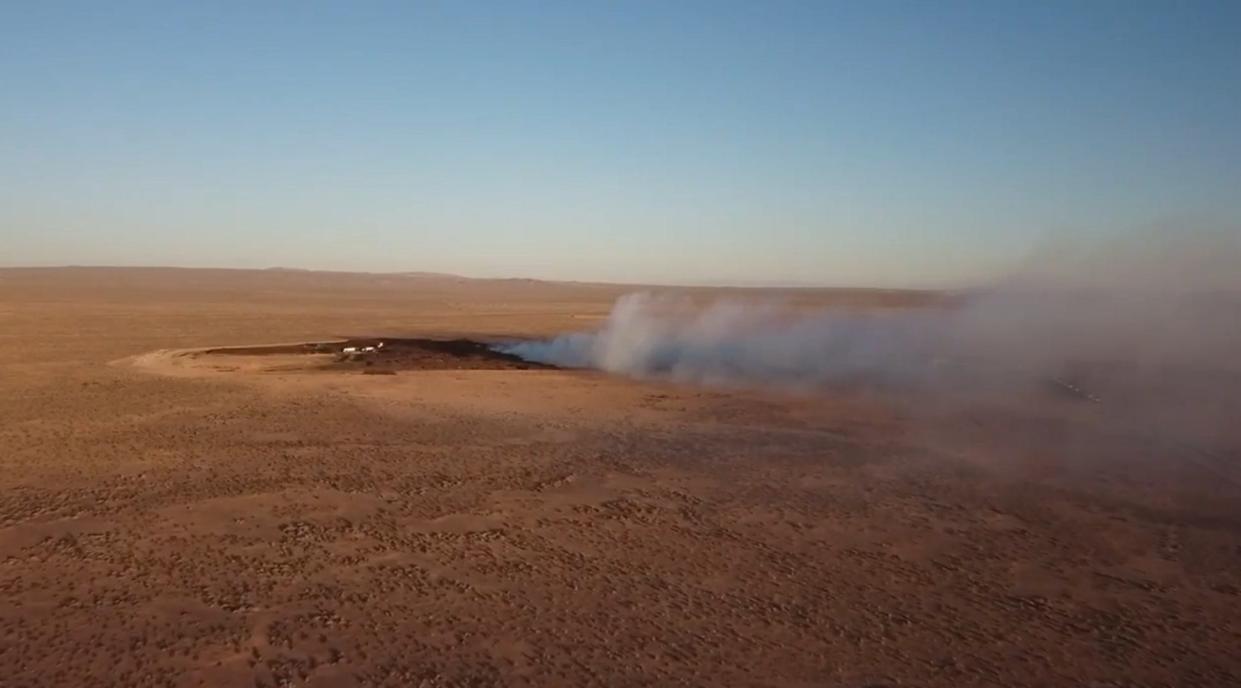
Wall Street giant Goldman Sachs Group Inc. and a green-branded sewage recycler are tapping an elite corporate-defense team as they prepare to fight lawsuits by hundreds of rural Mojave Desert residents in federal court.
At least 603 people, including 170 children, are set to be named as plaintiffs in one case formed by a merger of separate lawsuits filed last year in San Bernardino County Superior Court.
The suits stem from a months-long fire fueling mass complaints of rancid air and erratic ailments allegedly caused by the fumes from an 80-acre pit of “biosolids.” The sludge is a mix of wastes such as human feces from sewage streams across Southern California, which are sold as recycled fertilizer after purportedly being entirely separated from inorganics like plastic and treated at just-below-combustion heat for months.
Most of the plaintiffs live less than 10 miles downwind of the waste pit, in Hinkley — the unincorporated town where water-poisoning allegations led to historic Pacific Gas and Electric payouts and an Oscar-winning 2000 film, “Erin Brockovich” — and in areas of Barstow, stretching more than two-dozen miles east of what many locals call “the poop farm.”
Goldman Sachs is one of four named defendants, along with Baltimore, Maryland-based Synagro Technologies Inc., and two subsidiaries — Synagro-WWT Inc. and Nursery Products LLC.
The cases will be combined at the U.S. District Court in Los Angeles under federal Judge Fernando Aenlle-Rocha, a 2019 appointee of former President Donald Trump who was confirmed to his seat by the Senate in December 2020.
Three outcomes are on the table at this still-early stage of the lawsuits:
A jury trial, which would open the full scope of discovery and possible legal action in the federal waste-fire cases. This is by far the most expensive option for the defendants, if they lose.
A settlement in which both sides would agree on a price for the defendants to pay to kill the cases outside of court. A settlement could be sealed to bar the public from knowing any terms of the resolution.
An agreement to dismiss the cases by the judge set to oversee them in federal court, Aenlle-Rocha. This could happen if the court decides the cases aren’t worthy of taking to future stages.
The plaintiffs
Multiple law firms with ties to the Hollywood-popularized cases against PG&E over Hinkley’s water decades ago now represent residents of the same High Desert area in the Synagro waste-fire suits, according to state and federal court filings reviewed by the Daily Press.
One is Cotchett, Pitre & McCarthy LLP, a national firm that exclusively litigates, often focusing on alleged corporate or government exploitation. Its Santa Monica office has been led partly by lawyer Gary Praglin, who also helped run PG&E lawsuits directly tied to Brockovich, the paralegal and titular character in the film about some of those cases.
Praglin sent Synagro a formal request to preserve all evidence related to the fire on July 27 and filed two identical complaints on Oct. 3 and 4 on behalf of two sets of plaintiffs totaling 261 people at the time of the initial filings, including 59 children.
A married couple, Roberta Chavira-Walker and Gregory Walker, represent the only two plaintiffs in the case filed on Oct. 3. The case filed a day later covers hundreds more Hinkley-Barstow locals under a shortened title of “Christie Smith et al.”
The wife in the first suit, Chavira-Walker, produced much of the research that sparked Brockovich’s interest in Hinkley’s water and is the real-life inspiration of a fictional character named Donna Jensen in the film.
A few months earlier, on Aug. 4, two San Diego-based firms — the Schack Law Group and the Law Offices of Gregory J. Hout — launched the first waste-fire lawsuit with a separate group of plaintiffs that stood on the date of filing at 31 adult plaintiffs, jointly named on the court record as “Catherine A. Blevins et al.”
The lawyer who runs the latter firm, Hout, also represented Hinkley residents in individual cases against PG&E, a smaller scale than those publicly tied to Brockovich, and got settlements under non-disclosure terms.
The Schack Law Group separately represents plaintiffs in all kinds of individual, class- and mass-action lawsuits, mainly in California but also nationwide, including wildfire-focused litigation against PG&E and defendants as far as Colorado.
The firms began building their cases with visits to Hinkley and Barstow more than a month into the fire. They held open-invite meetings and encouraged residents to keep records such as diaries in real time documenting any health effects or basic disruptions to daily life they felt were being caused by the sewage-sludge fumes.
The latest publicly-available count puts the total number of High Desert plaintiffs just above 600 people, according to a Daily Press analysis of court records that “Blevins,” “Smith” and “Chavira-Walker” attorneys confirmed is accurate.
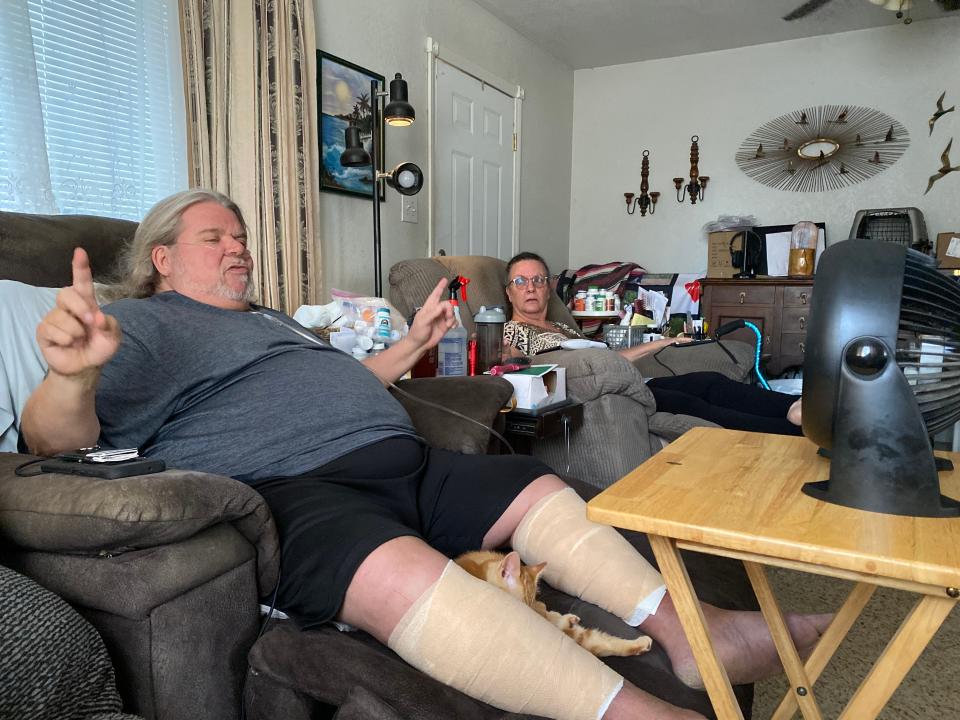
When the lawsuits are merged into one federal case, an amended complaint covering everyone involved is expected to add 200 adults and 111 children as new plaintiffs on top of those already named in court filings, according to a March 31 judge’s order.
The defendants
Goldman Sachs’ counsel comprises two Los Angeles-based partners and two New York-based partners of Orrick Herrington & Sutcliffe LLP. Orrick is a global law firm that legal periodical, The American Lawyer, has ranked five years in a row in the top five of its “A-List,” an annual listing of the 20 top-achieving U.S. law firms.
The Los Angeles pair, Orrick partners Bill Oxley and Meghan Kelly, didn’t respond to requests for comment.
The New York lawyers have gotten special “pro hac vice” approvals from Aenlle-Rocha to join Goldman Sachs’ defense team without being licensed to practice law in California. This tool is of specific use for defendants fighting cases across state lines and generally meant “to be used on a sparing and occasional basis,” Cornell Law School states on its website, citing estimates that around 15% of U.S. lawsuits involve “an attorney admitted pro hac vice.”
One of the New York lawyers in the Hinkley suits is Darrell Cafasso, who formerly served from late 2018 to January 2022 as Goldman Sachs’ global head of litigation and regulatory proceedings.
A highlight of Cafasso’s tenure in his role is helping resolve the now-globally infamous “1MDB” scandal. A late-2020 deal with the U.S. Department of Justice let Goldman Sachs pay $2.9 billion to admit to — while avoiding prosecution on — criminal charges for what the DOJ described as “a sweeping international corruption scheme” tied to billions of dollars in bribes to multiple governments. The bank also paid the Malaysian government $2.5 billion under similar terms.
The second New York-based lawyer on Goldman Sachs’ local counsel in the Hinkley waste-fire suits is Orrick senior associate Harry Murphy.
The three Synagro defendants have tapped separate legal representation. Their attorney is Brian Ledger, a partner and co-chair of the environmental practice group at Gordon Rees Scully Mansukhani, LLP, another massive law firm with offices in all 50 U.S. states. Ledger didn’t respond to a request for comment.
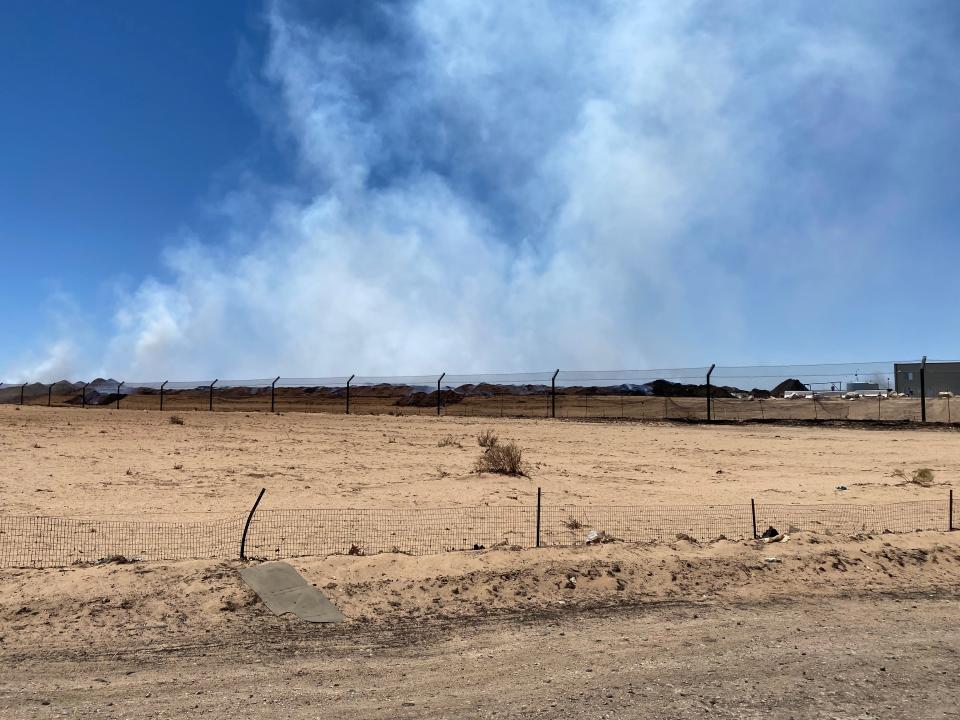
A smell residents ’could not escape’
The Hinkley-waste-fire plaintiffs used dozens of pages in their initial complaints to demand a jury trial against Goldman Sachs, the Synagro entities, and any future defendants they may add based on new information or evidence.
They argue for a range of relief, including unspecified, likely hefty payouts for damages and moving costs, future medical monitoring, and new restrictions or an all-out shutdown of the Synagro site in Hinkley. Their alleged causes for relief include multiple forms of nuisance, negligence, trespass, and “strict liability for ultrahazardous activity.”
When the fire erupted on May 28, 2022, it fueled waste-pit fumes for dozens of miles, mostly in the natural northeast direction of High Desert winds that put them on a direct trajectory for Hinkley and Barstow.
This caused residents to suffer from ”exposure to an array of toxic substances” and ”a noxious smell” while pumping burnt materials and soot into closely-neighboring homes. People couldn’t escape the smell even when they were in their ”homes, schools, churches, retail and service business,” or in the usually-pristine outdoor air of the desert, according to the lawsuit.
Early on, residents described the fire as "smelling of feces" and "the smell of death." They complained of "nonstop headaches," asthma and other respiratory problems, and nausea and vomiting.
People also started to find dead wild animals around the area and discovered their own "previously healthy, beloved pets dropping dead,” the Cotchett firm’s complaints state.
The complaints cite multiple Daily Press articles reporting exclusive first-hand details on a state investigation, air-quality complaints and the on-ground experience next-door to the fire in its first few weeks, when a public silence persisted among taxpayer-funded agencies that’s still fueling ire from many locals.
One point the lawsuits highlight is that many residents in the rural desert use swamp coolers that process outdoor air for their homes instead of central air-conditioning systems. With burnt biosolids fouling the air, many shut their coolers off during the first three months of the fire, when a summer-heat wave worsened the problem.
”Local residents’ swamp coolers became black from soot and coated in brown sludge,” the Cotchett complaints states. ”Residents were forced to change their swamp cooler filter pads on a regular basis [...] Absent air contamination at this level, a swamp cooler filter pad should only require replacement every one to two years.”
A federal-court-sized case
Separate from settlement talks and potential trial preparation, the defendants are pursuing a chance to convince Judge Aenlle-Rocha to dismiss the waste-fire suits.
An initial scheduling conference, discovery hearing, and hearing on a Goldman Sachs motion to dismiss have been postponed multiple times. New dates are currently on hold in the waste-fire cases.
San Bernardino County Superior Court hasn’t yet issued summons for the “Smith” lawsuit, delaying action in the other two cases. When summons are issued in the third suit, Goldman Sachs can file a notice moving it to federal court and begin the final process of combining it with the “Blevins” and “Chavira-Walker” cases under Aenlle-Rocha.
The lawsuits are in the process of being moved from California’s court system to federal court based on notices filed by Goldman Sachs, with supporting declarations by Synagro Technologies on behalf of itself and the other two defendants.
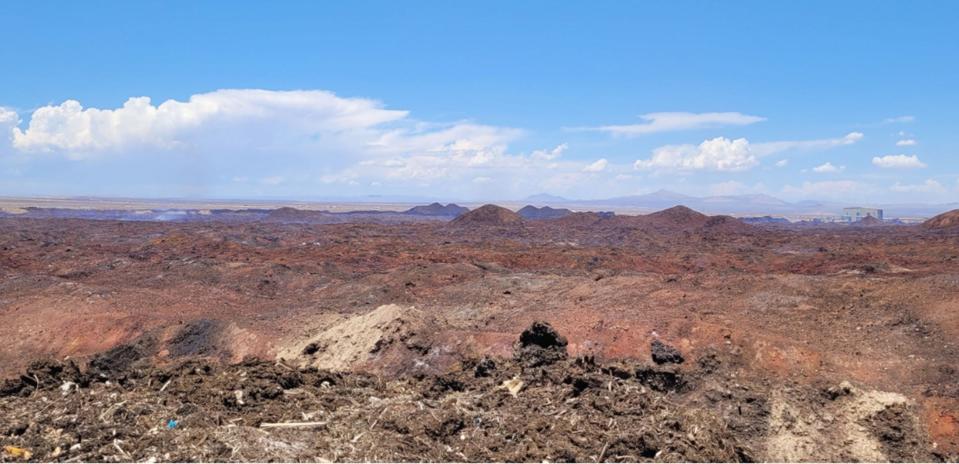
They argue the U.S. district court is the proper venue for the Hinkley waste-fire cases based on two points, according to the notices:
The defendants are “citizens of different states” than the California plaintiffs — in court-jurisdiction terms, Goldman Sachs claims citizenship of New York and Delaware; Synagro Technologies claims Maryland and Delaware; and the two Synagro subsidiaries claim Maryland alone
Goldman Sachs “conservatively estimates that the amount in controversy” — a dollar figure meant to capture the total amount at stake in a lawsuit — “significantly exceeds” a $75,000-per-person minimum for each of the more than 600 High Desert plaintiffs.
The second point puts a big potential price tag on the Hinkley waste-fire cases. If every plaintiff sought just $75,000 alone, it would total more than $45 million.
Goldman Sachs says that’s paltry relative to the actual amount being demanded. Its notices compare the Hinkley claims to past lawsuits where, based on similar allegations, individual plaintiffs were awarded between $500,000 and $1.9 million.
The waste-fire cases haven’t yet reached a point of substantial debate on the allegations themselves.
Instead, the defendants focus in early motion-to-dismiss filings on how thorough the initial court complaints are in proving that each is involved in the Hinkley factory’s operations and, thus, that each can be held liable for harm allegedly caused by the sewage-sludge fire.
In an Oct. 31 memo, Goldman Sachs argued the “Blevins” complaint doesn’t include any facts that show it operates the facility, is responsible for supervising its employees, or directed the facility to accept excessive or unpermitted waste.
Synagro joined this motion in a brief follow-up filing that day, arguing Blevins also doesn't make allegations that Synagro Technologies and Synagro-WWT directly engaged in the facility’s operations.
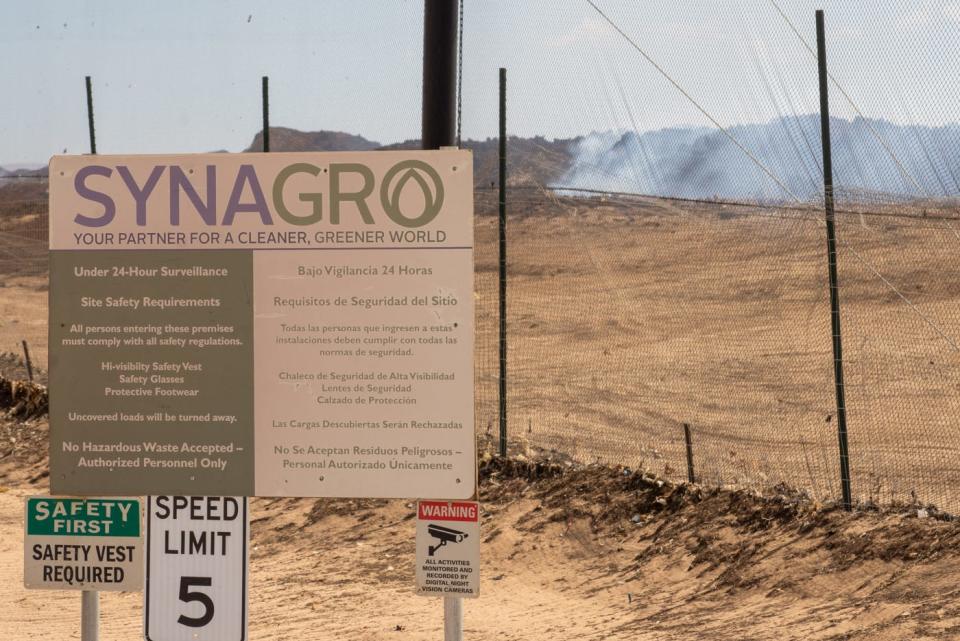
The waste-pit fire happened at what’s officially known as the Nursery Products Hawes Composting Facility.
The factory is owned on paper by Nursery Products LLC, but Synagro bought this entity in 2016 and publicly touted the deal at the time as a take-over of its Hinkley factory; its sole “member” in LLC filings is Synagro-WWT, which is itself a direct subsidiary of the global parent corporation, Synagro Technologies.
Goldman Sachs is the fourth named defendant in the lawsuits because, atop the chain of ownership, Synagro Technologies itself is owned by a private-equity fund that the bank manages.
The fund, launched by Goldman Sachs in 2016, is called West Street Global Infrastructure Partners III LP. It bought the parent Synagro corporation in late 2020.
Charlie McGee covers California’s High Desert for the Daily Press, focusing on the city of Barstow and its surrounding communities. He is also a Report for America corps member with The GroundTruth Project, an independent, nonpartisan, nonprofit news organization dedicated to supporting the next generation of journalists in the U.S. and worldwide. McGee may be reached at 760-955-5341 or cmcgee@gannett.com. Follow him on Twitter @bycharliemcgee.
This article originally appeared on Victorville Daily Press: 600 High Desert locals suing Goldman Sachs in federal ‘poop farm’ case

